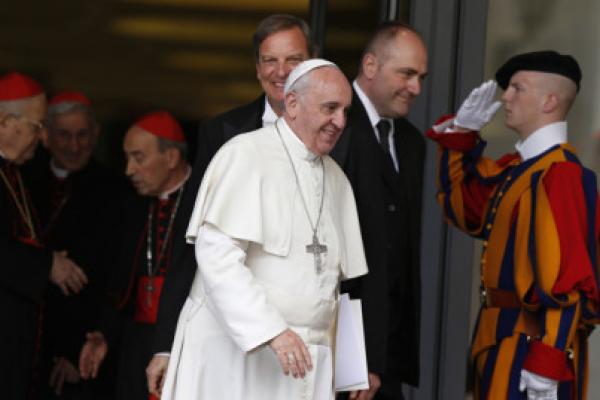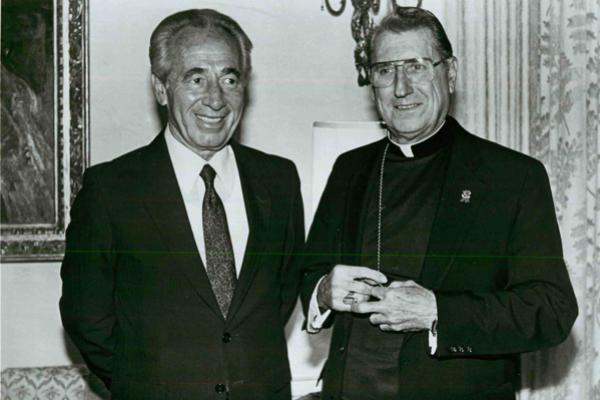The recent focus on the kidnapped girls in Nigeria shines a light on the suffering of women and girls all around the world.
Perhaps it is due to my ongoing fascination with Jewish and Christian apocalypses that the motif of suffering is constantly on my mind. I am always struck with John the Seer’s words of praise and encouragement in his letters to the seven churches of the Apocalypse that are patiently enduring persecution, affliction, distress, and tribulation.
It seems that from a Christian perspective, suffering is to be expected and just part of the deal of Christian membership — a real scriptural blow to prosperity gospels! Thus it should come as no surprise to us when the letter of 1 Peter 4:12-14 and 5:6-11 emphasizes the same themes of present suffering as a marker for future reward.
Jeju Island, South Korea — For the past two weeks, I’ve been in the Republic of Korea (ROK), as a guest of peace activists living in Gangjeong Village on ROK’s Jeju Island. Gangjeong is one of the ROK’s smallest villages, yet activists here, in their struggle against the construction of a massive naval base, have inspired people around the world.
Since 2007, activists have risked arrests, imprisonment, heavy fines, and wildly excessive use of police force to resist the desecration caused as mega-corporations like Samsung and Daelim build a base to accommodate U.S. nuclear-powered aircraft carriers and submarines for their missions throughout Asia. The base fits the regional needs of the U.S. for a maritime military outpost that would enable it to continue developing its Asia Pivot strategy, gradually building towards and in the process provoking superpower conflict with China.
“We don’t need this base,” says Bishop Kang, a Catholic prelate who vigorously supports the opposition.
The French composer Claude Debussy once said, "Music is the space between the notes." His compositions were a part of Impressionism in music, a movement in the late 19th and early 20th centuries that focused on suggestion and atmosphere and favored short forms of music like nocturnes, arabesques, and preludes. This movement was a correction of the excesses of the Romantic period, where the focus was on strong emotion and the depiction of stories and the favor was toward long forms of music like symphonies and concertos.
This week’s “10 Best Stories” missed an important news item from Palestine — not about Pope Francis but rather a family that practices what the pope preaches.
Tent of Nations, in the Occupied West Bank, has become a sign of hope over the otherwise fruitless last decades of peace negotiations. Interlocutors have nibbled around the edges of a “two state solution” since the early 1990s with the result that Israel has been able to confiscate vast areas of Palestine. The Nassar family, represented by Daoud and his parents and siblings, have built on their 100 acres a veritable garden of peace. This luxuriant vineyard is 15 minutes from Manger Square, Bethlehem. It has been owned by the Nassars since Ottoman times, and “Tent” has illustrated, what is declared on a stone at its entrance – non-violent action in its most faithful form. More than 7,000 visitors from around the world along with children in summer camps, as well as both Israelis and Palestinians, have been buoyed by the Nassars' 100-year commitment to living peaceable amidst turmoil by expressing biblical principles of loving neighbors, forgiving those who oppress, and peaceful coexistence with their neighbors.
Early on May 19, military bulldozers destroyed 1,500 fruit trees nearly ready for harvest in the valley below the Nassar dwellings. There was no warning of the impending destruction of the trees and terraced land, left in a state of rubble with no hope of being replanted. Daoud said the family was awaiting word on an appeal submitted after military orders to stop cultivation; bulldozers came before a legal response.
So my son comes marching into the kitchen, and says in a demanding tone, "Make me snacks now!" My first reaction is to think that this is simply unacceptable behavior, and that he needs a good talking to. But I also notice that I am quite triggered by this, and that before I do anything, I need to reflect.
So I start boiling water for some pasta (I do have enough sense to know that when he asks for a snack that what his body really needs is some healthy food and not junk). As the water boils it dawns on me why he was so rude. In a word: metabolism.
It's amazing to me how much of our spiritual and emotional problems have clear biological and physical causes. The reason he was so demanding is that his body was hungry, and so his brain went into alarm mode:
I need food NOW .
The problem is not that he is a rude kid, it's that his metabolism was flooding his brain. If I had scolded him this would have had the effect of riling up his brain even more, which was already in freakout mode (I'll leave it to a neurobiologist to explain this with big $10 words like amygdala and cerebral cortex, but the basic science here is quite solid).
Vincent Harding died on Monday. One of my most important and dearest mentors is gone; there are countless other people across America — indeed, around the world — who are feeling the same as me.
But he really hasn’t gone; his memory and presence will continue on with us in a “cloud of witnesses,” which is the most important thing Vincent ever taught me.
At the Illiff School of Theology in Denver — the last place he worked and taught — Vincent’s title was “Professor of Religion and Social Transformation.” That was apt for someone who spent his life teaching and showing how faith was meant to transform the world, beginning with our own lives.
The first time I met Vincent Harding was at a talk he gave at Eastern Mennonite University titled something like “The People Around Martin Luther King Jr.” We expected to hear about all the famous civil right leaders from the movement. Instead, he spoke of those who had gone before, often many years before King, who had shaped, inspired, and sustained him like a family tree, a community of faith, or “a cloud of witnesses.”
Why is it so difficult for some people to respond to climate change in a thoughtful way? Sen. Marco Rubio says he doesn’t believe human activity is causing changes to the global climate. He told ABC News: “I do not believe that human activity is causing these dramatic changes to our climate the way these scientists are portraying it, and I do not believe that the laws that they propose we pass will do anything about it, except it will destroy our economy.”
But if Sen. Rubio believes that humans aren’t causing climate change, who does he believe is? Does he believe that climate change is natural, perhaps an act of God? The senator is a Christian , and he would be wise to listen to the words of a variety of religious leaders who have spoken about care for creation.
The visit of Pope Francis to Palestine, though initially intended to be a simple ecumenical meeting with the Patriarch of Constantinople, has turned into an enormous opportunity for His Holiness to reaffirm his commitment to peace and justice in a land that so desperately craves these things.
Francis’ visit is both timely and crucial. We Palestinians heard him clearly when he said: “We must restore hope to young people, help the old, be open to the future and spread love. Be poor among the poor. We need to include the excluded and preach peace.”
What a difference 10 years makes.
Fast-forward to 2014, and the cultural and legal landscape could hardly be more different. Today, 19 states and the District of Columbia allow same-sex marriage, and federal courts have struck down bans in 11 more states. The U.S. Supreme Court ordered the federal government to recognize same-sex marriages after ditching a central portion of the 1996 Defense of Marriage Act last year, and 44 percent of Americans now live in states that allow same-sex marriage.
After four same-sex couples filed suit Wednesday challenging Montana’s ban on same-sex marriage, neighboring North Dakota is the only state that isn’t facing a challenge to its gay marriage ban — at least not yet.
So what changed?
In April 1908, Dorothy Gumple, a 19-year-old Jewish woman living in Connecticut, converted to Roman Catholicism. Less than two years, later she married a Catholic immigrant from Ireland. They and their five children lived in Philadelphia where her husband was a lifelong trade union member. It is not exactly the stuff global news stories are made of.
Except this: Their fourth child became the world-famous archbishop of New York, Cardinal John J. O’Connor, who served in that position from 1984 until his death in 2000.








